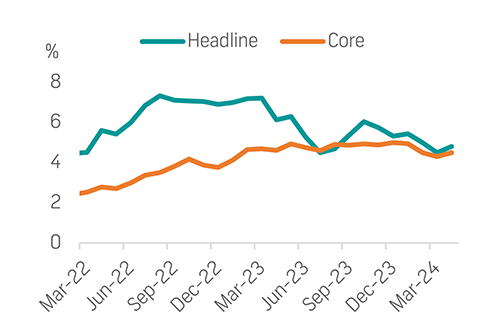The ripple effects of El Niño-induced price pressures on food inflation are expected to be particularly pronounced in the second half of 2020, to be further exacerbated by an anticipated decrease in supply resulting from unfavourable harvest conditions. The adverse conditions are expected to push up domestic inflation to 5% in May 2024, and remaining above this level for the short-term.
This is the headline inflation outlook from FNB economists Ruusa Nandago and Helena Mboti in the latest FNB Consumer Price Index (CPI) review.
Domestic headline inflation increased from 4.5% year-on-year (y/y) in March 2024 to 4.8% y/y in April 2024. Monthly inflation is projected to decelerate, moving from 0.7% in April 2024 to 0.4% in May 2024. Despite this moderation, the FNB review stated the presence of a positive figure underscores a continued marginal increase in prices month-on-month, affirming the bank’s stance on the persistent upside risks to inflation.
The FNB review noted that fuel prices, bolstered by both an increase in the Namport Levy and global oil price trends, remain high.
“We anticipate the most significant upward pressure on prices within the transportation inflation category, with an expected rise from 5.9% year-on-year in April 2024 to 7.7% in May 2024. This projection is influenced by recent actions such as the Ministry of Mines and Energy’s fuel price adjustments in April,” FNB stated.
Furthermore, in the housing and utilities sector, FNB foresees a rise in prices towards the end of the year, propelled by constrained water supply. The higher prices are expected to be compounded by an 8% tariff hike announced by the Electricity Control Board, effective July 2024.
“Given that these three sectors collectively represent approximately 59% of the CPI basket, the anticipated escalation in transport and utility costs is likely to not only have a direct impact on headline inflation, but also cascade through the economy, elevating input costs across industries and consequently pushing up prices in other sectors due to secondary effects,” the FNB economists stated.
In terms of core inflation, FNB anticipates a marginal decrease of 0.1 percentage points to 4.4% y/y in May 2024, followed by stability in June 2024. “However, we project a reversal in July 2024, as the risks, particularly the impact of heightened transport and electricity costs on input expenses across sectors, begin to materialise,” the economists added.


